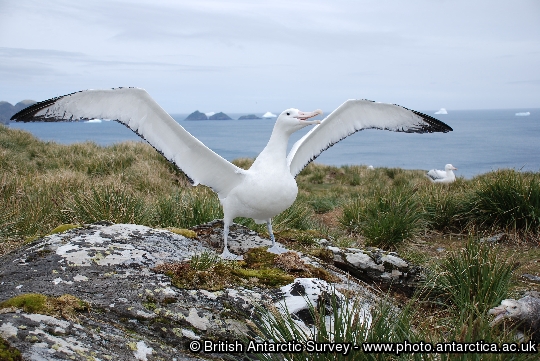This week on Frozen Planet (BBC1 Wednesday 2 November at 21.00, repeated Sunday at 16.10) the programme explores Spring in the Polar Regions and how life begins the race to breed. Many of the iconic species of the Antarctic — king and macaroni penguins, elephant seals and wandering albatrosses — feature in episode 2 and were filmed at South Georgia from Bird Island Research Station with help from BAS scientists.

Since the early 1960s, BAS scientists have monitored many of the animals living on Bird Island, including albatross populations. During this time a range of innovative techniques and technologies have been developed and used to monitor breeding and foraging ecology. The return rates of ringed birds give scientists an indication of breeding frequency and survival rates, while tiny satellite-tracking and geolocator devices give an accurate picture of the vast areas of ocean covered by these birds in search of food. Pioneering satellite tracking studies by BAS scientists in the early 1990s gave the first real evidence that some albatrosses spend substantial amounts of time foraging behind commercial fishing vessels. In this programme, viewers will glimpse albatross behaviour including courting and fledging.
Antarctic fur seals and elephant seals on South Georgia feature in episode 2. Both breed in dense colonies on beaches. Here, dominant males (bulls) maintain harems of females (cows) in territories. In constantly defending these, bulls will not forage at sea, relying instead on blubber reserves laid down in the previous winter.
Ambitious and epic in scale, Frozen Planet captures all the fragile, jaw-dropping beauty and majestic power of the elements in the greatest wilderness on Earth. Narrated by David Attenborough and featuring the incredible wildlife cinematography that made Planet Earth such a worldwide success, the team have really pushed the limits.
Access to the Polar Regions, especially the Antarctic is a real challenge. British Antarctic Survey is pleased to have contributed its regional knowledge and science expertise to help facilitate BBC crew visits to its Rothera and Bird Island Research Stations in 2010. With help from the scientists on the ground, the series delves into the behaviour of animals on South Georgia and later heads to a recently collapsed ice shelf on the Antarctic Peninsula with BAS glaciologist Dr Andy Smith.
- BBC Frozen Planet website
- Learn more about the Antarctic and Arctic on the OU website
- Discovering Antarctica
- Discovering the Arctic
- Foreign & Commonwealth Office Polar Regions Unit
Claim your fabulous FREE polar regions map/poster produced by the OU, in association with BAS
